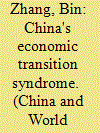| Srl | Item |
| 1 |
ID:
138900


|
|
|
|
|
| Summary/Abstract |
Following 30 years of high economic growth, China's economy is in the midst of a classic transition from an industrial to a post-industrial economy. In this transition period, the mismatch between supply and demand is growing, while the country's economic growth engine is weakening. Stimulus policies have aimed to maintain the country's economic growth momentum but they have come at the price of sharply increased financial fragility and resource misallocation, both of which are harmful to economic growth. China's “economic transition syndrome” refers to the vicious cycle of slowing GDP growth, combined with increasing demand for stimulus policies, and increasing financial fragility and resource misallocation.
|
|
|
|
|
|
|
|
|
|
|
|
|
|
|
|
| 2 |
ID:
076894


|
|
|
|
|
| Publication |
2007.
|
| Summary/Abstract |
Pegging the RMB exchange rate to the Asian currency unit (ACU) has not, at least in the short term, been proved a better solution than pegging to the US dollar or pegging to a G-3 (US$, Japanese yen and euro) currency basket. Although the Asian currency unit can help Asian economies to keep the relative price of regional currencies stable, the cost of joining a formal regional monetary cooperation is the relinquishment of the autonomy of their domestic policies. Asian monetary cooperation needs to provide more potential benefits if it is to attract Asian economies. We argue that Asian monetary cooperation should be designed to solve the problem of regional trade imbalance, and regional exchange rate policy coordination should be adopted as the first step towards exchange rate cooperation
|
|
|
|
|
|
|
|
|
|
|
|
|
|
|
|
| 3 |
ID:
152509


|
|
|
|
|
| Summary/Abstract |
Persistent renminbi (RMB) devaluation expectations are one of the greatest threats to China's macroeconomic stability. Market interventions backed by huge foreign exchange reserves and capital controls are not sufficient to eliminate the expectations of devaluation. Creating a market-based and flexible RMB exchange rate regime holds the key to the elimination of devaluation expectations. The present paper compares the pros and cons of several policy options, and proposes to introduce, as a transition to free floating, a new exchange rate regime pegged to a currency basket with a wide band. The new regime should be able to give the RMB exchange rate enough flexibility to eliminate devaluation expectations as well as prevent excessive overshooting. To ensure a smooth transition, the new regime needs to be supported by controlling cross-border capital flows.
|
|
|
|
|
|
|
|
|
|
|
|
|
|
|
|